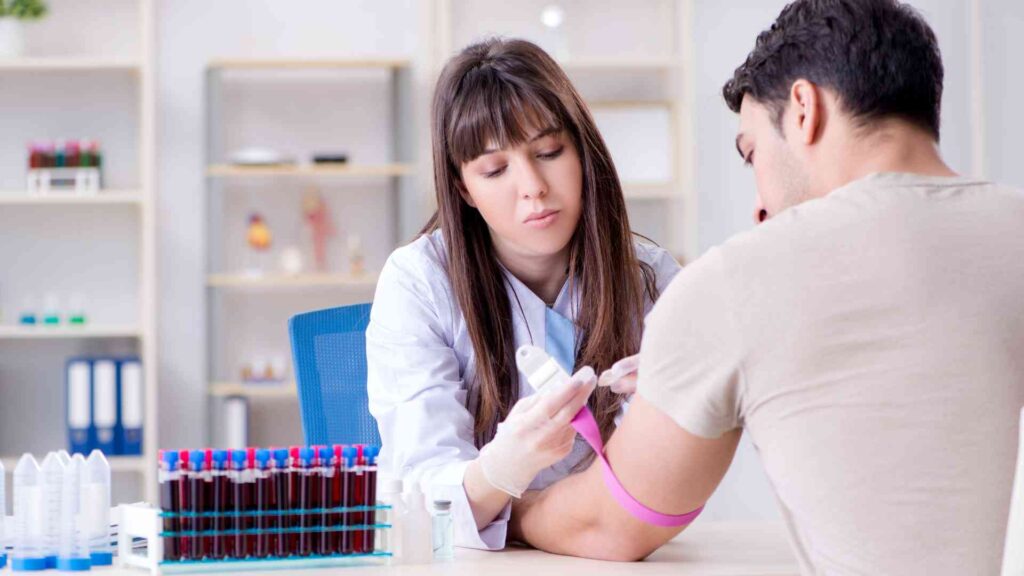Discover comprehensive information for all aspects of sexual health and find resources and guidance to empower your sexual well-being.
Erectile dysfunction (ED) is a condition that many men face at some point in their…
Discover comprehensive information for all aspects of sexual health and find resources and guidance to empower your sexual well-being.
Erectile dysfunction (ED) is a condition that many men face at some point in their…
The underlying cause as well as the severity of pain determine the varied treatment approaches…
Erectile dysfunction (ED) is a condition that affects many men worldwide, leading to significant stress,…
Feeling nervous about sexual performance, known as Sexual Performance Anxiety (SPA), is pretty common. But…
Erectile dysfunction (ED) is a common condition affecting men, often characterized by the inability to…
Sleep-related painful erection (SRPE) is a rare condition where people get painful erections while they’re…
Mindfulness, defined as paying attention to present-moment experiences with an open and non-judgmental attitude, has…
Erectile dysfunction (ED) is a common condition affecting men, often characterized by the inability to achieve or maintain an erection firm enough for sexual intercourse.
While it can be distressing, it’s essential to understand that ED is a medical condition with various causes and effective treatment options available.
Table of Contents
ToggleErectile dysfunction, commonly known as impotence, refers to the persistent inability to achieve or sustain an erection suitable for sexual intercourse.
It’s important to note that occasional difficulty with erections is normal and doesn’t necessarily indicate ED. However, when the problem becomes persistent, it may warrant medical attention.

ED can stem from various physical conditions affecting blood flow to the penis or interfering with the nerve signals necessary for arousal. Common physical causes include cardiovascular disease, diabetes, obesity, high blood pressure, and hormonal imbalances.
Mental health issues such as stress, anxiety, depression, and relationship problems can significantly contribute to ED.
Psychological factors often exacerbate or even directly cause ED by interfering with sexual arousal mechanisms.
Related: Sexual Performance Anxiety
Unhealthy lifestyle habits, including excessive alcohol consumption, smoking, drug abuse, and a sedentary lifestyle, can increase the risk of developing erectile dysfunction. These habits can contribute to the underlying physical conditions that lead to ED.
The primary symptom of erectile dysfunction is the inability to achieve or maintain an erection firm enough for sexual activity. However, ED can manifest in various other ways, including:

Diagnosing erectile dysfunction typically involves a comprehensive evaluation by a healthcare professional, often a urologist or a primary care physician. The diagnostic process may include:
Medical History: The healthcare provider will inquire about your medical history, including any underlying health conditions, medications, lifestyle factors, and sexual history.
Physical Examination: A physical examination may be conducted to assess the overall health and identify any physical factors contributing to ED. This may include examining the penis and testicles for abnormalities.
Blood Tests: Blood tests may be ordered to check for underlying health conditions such as diabetes, hormonal imbalances, and cardiovascular disease, all of which can contribute to erectile dysfunction.
Psychological Evaluation: In some cases, a psychological evaluation may be recommended to assess for any underlying mental health issues contributing to ED.
Specialized Tests: In certain situations, specialized tests such as nocturnal penile tumescence (NPT) testing or penile Doppler ultrasound may be performed to assess blood flow and nerve function in the penis.

Fortunately, there are various effective treatments available for ED, tailored to address the underlying cause and individual needs of each patient. Treatment options may include:
Making positive lifestyle changes such as adopting a healthy diet, exercising regularly, quitting smoking, limiting alcohol consumption, and managing stress can significantly improve erectile function.
Oral medications such as sildenafil (Viagra), tadalafil (Cialis), and vardenafil (Levitra) are commonly prescribed to help improve blood flow to the penis and facilitate erections. These medications are usually taken shortly before sexual activity and are effective for many men.
For individuals with hormonal imbalances contributing to ED, hormone replacement therapy may be recommended to restore normal hormone levels and improve sexual function.
Counseling or therapy may be beneficial for individuals experiencing psychological factors contributing to erectile dysfunction. Cognitive-behavioral therapy (CBT) and couples therapy can help address underlying issues and improve sexual satisfaction.
Vacuum Devices and Penile Implants: In cases where other treatments are ineffective or not suitable, vacuum erection devices or surgical placement of penile implants may be considered to achieve erections.
Related: Latest Treatment For Erectile Dysfunction
Erectile dysfunction is a common condition that can significantly impact a man’s quality of life and intimate relationships. However, with proper diagnosis and treatment, many men can overcome ED and regain satisfying sexual function.
If you’re experiencing symptoms of ED, don’t hesitate to seek medical advice and explore the available treatment options tailored to your needs. Remember, you’re not alone, and help is available to address this common and treatable condition.
References
Dr. Nishtha, a medical doctor holding both an MBBS and an MD in Biochemistry, possesses a profound passion for nutrition and wellness. Her personal journey, marked by significant struggles with physical and mental health, has endowed her with a unique empathy and insight into the challenges countless individuals face. Driven by her own experiences, she leverages her background to offer practical, evidence-backed guidance, empowering others on their paths to achieving holistic well-being. Dr. Nishtha truly believes in the interconnectedness of the mind and body. She emphasizes the significance of understanding this connection as a crucial stride toward attaining balance and happiness in life.

